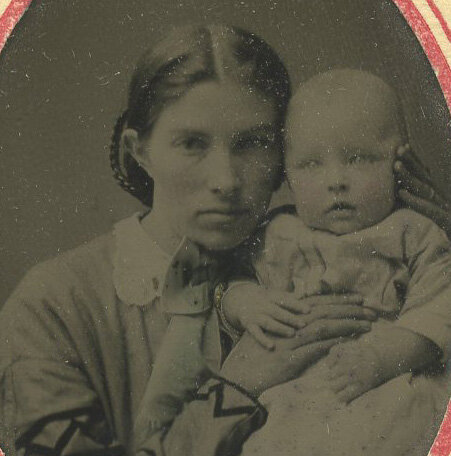George Wolfer playing the Opheicleide
Wolfer Family
About the Wolfer Family
To Harmony
Frederick Wolfer and his wife Elizabeth arrived at George Rapp’s Harmony Society with their five daughters in 1805. The following year their son John was born and then Rudolf in 1810. Frederick worked as a herdsman at Harmony and his son Rudolf was eventually trained as a printer. In 1832 Frederick and most of his family broke from the Harmonists and lived on their own in Indiana until deciding to join Dr. Keil at Bethel in 1849.
When Do We Get To Aurora?
George Wolfer was among the 250 people who arrived at Aurora in the 1863 wagon train. That he was surprised by the primitive conditions of the village can be gleaned from the question he asked of his friend Henry Fry: “When do we get to Aurora?” “George, you are right in Aurora.” Wolfer was so stunned by this remark that he had the breath knocked out of him.
Unspeakable Tragedy
During the fall of 1862 forty three year old Adam McClure took sick with smallpox. Dr. Keil, hearing of his helplessness, commissioned John Wolfer to go and care for him. After returning home, John’s wife Lucinda was stricken with the dread disease. Unfortunately, four of Dr. Keil’s young children, who often spent a lot of time with Lucinda, also came down with the disease. Lucinda died on November 3rd, followed over the next six weeks by the four Keil children including Aurora, for whom the town was named. John Wolfer, despite catching the sickness also, survived and lived until 1892.
Henry M. Wolfer
Henry Morris Wolfer, a descendant of John Wolfer, conducted a lot of research on the Wolfer family and the Aurora Colony during the 1980s up to his death on June 28, 1988. He corrected many stories and established new and important links to other Wolfer family members. “I have a lot of roots in Oregon,” he wrote. “My grandfather used to say to me ‘Don’t let anyone tell you that you can’t do something — you just do it.’ So I do it.”
A Great Collector
Early in the Spring of 1924 Portland area antiquarian Frederick Woodward Skiff found a new interest in the handcrafts of the Aurora Colonists. Thus, he pulled up in front of the George Wolfer home in Hubbard, Oregon, knocked on the door and it was answered by Wolfer’s foster sons Clark and Charles Will. Mr. Skiff made use of Wolfer’s wide acquaintances in the mid-Willamette Valley to visit many of the surviving Colony descendants, often accompanied by Wolfer and the boys, who brought along a fast lens Kodak to document the trips. In this manner much was gathered about the history of the Aurora Colony.









